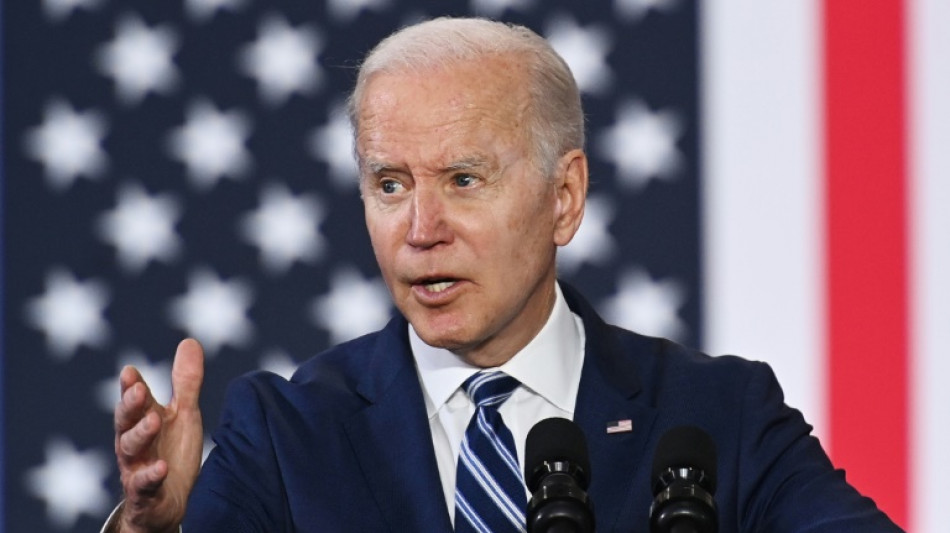
-
 Barca edge Real Madrid in extra-time to win wild Copa del Rey final
Barca edge Real Madrid in extra-time to win wild Copa del Rey final
-
'Legendary' Eubank Jr beats Benn in grudge bout
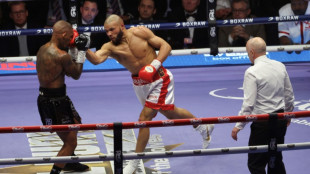
-
 Thunder sweep past Grizzlies into NBA playoffs 2nd round, Cavs on brink
Thunder sweep past Grizzlies into NBA playoffs 2nd round, Cavs on brink
-
South Korea's Ryu and Japan's Saigo share LPGA Chevron lead

-
 Canada leaders make closing pitches in campaign upended by Trump
Canada leaders make closing pitches in campaign upended by Trump
-
De Bruyne's Man City exit 'so difficult' for Guardiola

-
 'No regrets' for Amorim over Man Utd move
'No regrets' for Amorim over Man Utd move
-
Lyon and Strasbourg win to close in on Europe, Montpellier relegated from Ligue 1

-
 Toulouse thrash Castres as Top 14 pursuers stumble
Toulouse thrash Castres as Top 14 pursuers stumble
-
Djokovic crashes to nervous Arnaldi in Madrid opener, Swiatek advances

-
 Olympic champs Russell, Davis-Woodhall win at Drake Relays
Olympic champs Russell, Davis-Woodhall win at Drake Relays
-
Browns end Sanders long draft slide

-
 Cavs crush Heat, on brink of NBA playoff sweep
Cavs crush Heat, on brink of NBA playoff sweep
-
Fire rages after major blast at Iran port kills 8, injures hundreds

-
 Kiwi Beamish wins Penn Relays 1,500m crown with late kick
Kiwi Beamish wins Penn Relays 1,500m crown with late kick
-
Mbappe on Real Madrid bench for Clasico Copa del Rey final

-
 England survive France fightback to seal Women's 6 Nations slam
England survive France fightback to seal Women's 6 Nations slam
-
Palace sweep past Villa to reach FA Cup final

-
 CAF appoint Moroccan Lekjaa first vice-president
CAF appoint Moroccan Lekjaa first vice-president
-
Major blast at Iran port kills 5, injures hundreds

-
 Rodgers vows to stay with Celtic after fourth successive Scottish title
Rodgers vows to stay with Celtic after fourth successive Scottish title
-
Ipswich relegated as Newcastle, Chelsea boost top five bids

-
 Canada leaders make final pitches in campaign upended by Trump
Canada leaders make final pitches in campaign upended by Trump
-
Mullins -- Ireland's national training treasure

-
 US, Iran say progress in 'positive' nuclear talks
US, Iran say progress in 'positive' nuclear talks
-
Mullins emulates O'Brien with second successive trainer's title
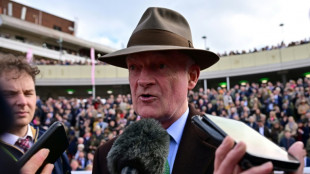
-
 Ipswich relegated after one season in Premier League
Ipswich relegated after one season in Premier League
-
Just Stop Oil activist group holds final march
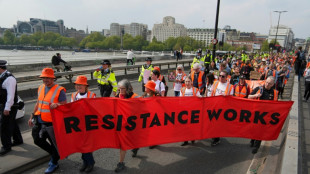
-
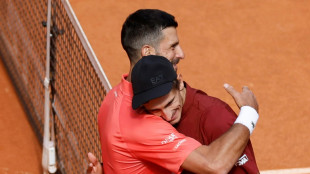 Djokovic crashes to nervous Arnaldi in Madrid opener
Djokovic crashes to nervous Arnaldi in Madrid opener
-
Syria's Kurds demand 'democratic decentralised' Syria
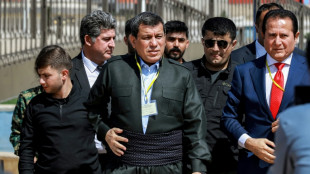
-
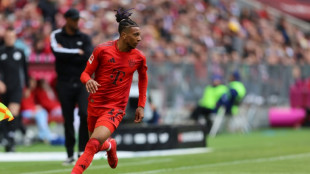 Leverkusen win to delay Bayern and Kane's title party
Leverkusen win to delay Bayern and Kane's title party
-
Buenos Aires farewells native pontiff with tears and calls to action
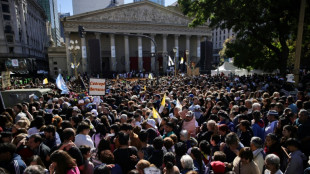
-
 Turkey's opposition says Erdogan's canal plan behind latest arrests
Turkey's opposition says Erdogan's canal plan behind latest arrests
-
Maresca hails 'nasty' Chelsea as top five bid stays alive

-
 Trump raises Putin doubts after Zelensky talks at pope's funeral
Trump raises Putin doubts after Zelensky talks at pope's funeral
-
Major blast at Iran port kills 4, injures hundreds

-
 Napoleon's sword to be sold at auction in Paris
Napoleon's sword to be sold at auction in Paris
-
Iran, US discuss nuclear deal in third round of talks

-
 Buenos Aires farewells native pontiff with call to action
Buenos Aires farewells native pontiff with call to action
-
Warholm sets hurdles world record at Diamond League, Holloway shocked

-
 US students 'race' sperm in reproductive health stunt
US students 'race' sperm in reproductive health stunt
-
Wikileaks founder Assange joins crowds for pope funeral

-
 Leader Marc Marquez claims Spanish MotoGP sprint victory
Leader Marc Marquez claims Spanish MotoGP sprint victory
-
Celtic win fourth successive Scottish Premiership title

-
 Jackson ends drought as Chelsea boost top five push
Jackson ends drought as Chelsea boost top five push
-
Warholm sets 300m hurdles world record in Diamond League opener

-
 Major blast at south Iran port kills 4, injures hundreds
Major blast at south Iran port kills 4, injures hundreds
-
Russia says retook Kursk from Ukraine with North Korean help

-
 Francis laid to rest as 400,000 mourn pope 'with an open heart'
Francis laid to rest as 400,000 mourn pope 'with an open heart'
-
Trump, Zelensky meet on sidelines of pope's funeral


Biden and West stare down gauntlet of long war in Ukraine
The United States and its allies have warned the world: the next phase of the war in Ukraine will be long. And it will pose a daunting diplomatic task for Joe Biden, who must find a way to maintain unprecedented Western unity against Moscow -- for the duration.
The world must prepare for a "long fight ahead," the US president said during his visit to Poland last month.
In Washington, there is a certain satisfaction with the way the first phase of the war has played out, since Russia invaded February 24.
American intelligence had expected the capital Kyiv to fall quickly, but with US and European backing, Ukrainian forces have pushed Russian troops back into the country's east.
And the US government -- along with the European Union and NATO -- has organized a vast coalition to impose extraordinary economic sanctions on Russia.
But as the new battle takes shape in Ukraine's east, American strategists fear this mutual effort will gradually deteriorate.
If the fighting stays concentrated in the Donbas region, far from Kyiv and NATO's eastern border, the feeling of urgency that has so far united the West is likely to fade, according to a diplomat.
"It's a challenge," he told AFP.
Another official believes that some European countries -- which are deeply affected by the inflation precipitated by the sanctions -- could be tempted to release some of the pressure on Russia.
- 'Escalation of horror' -
Such a scenario does not seem imminent, at least for now.
"I think the upcoming battle is going to be spectacular," involving "big battles between big armies," former US ambassador to Kyiv William Taylor said.
"We're talking about World War II kinds of battles," he told AFP.
"What we see from the Russians is a willingness to kill civilians in large numbers," said Taylor, who is currently the vice president of the think tank United States Institute of Peace.
"So I think the urgency and the attention... is going to be focused on Ukraine even more intensely."
Marie Jourdain, who is a French researcher at another Washington think tank, the Atlantic Council, said "the intensity of the combat, but also the risk of escalation of the horror (of war) in the coming weeks" are likely to strengthen the resolve of the anti-Kremlin front.
But if the war drags on and becomes a "frozen conflict," "a certain normalization of the images or of the stories of horror risks limiting emotional reactions," she said.
For Jourdain, the "major issue" for the West therefore will be "maintaining the unity and the pressure in regards to Russia in a context of growing disinterest" among the public -- who are also growing weary of the "economic repercussions" of the ordeal.
For now, the United States and several European countries would still rather turn up the temperature on Russian President Vladimir Putin.
But they have already hit him hard, and the West is running out of future options.
- 'Pressure from Congress' -
The United States places much of its hope on a measure that is not flashy, but which they hope will eventually produce results: a ban on exporting to Russia technology that Moscow relies on for its military industry.
Long-term, the Russian army won't be able to replenish its weapons arsenal and missiles, Washington predicts.
But more than anything, it is a European ban on Russian oil, or even gas -- like the one already in place on the American side -- that could substantially change the situation, by depriving the Russian economy of a major source of funds.
Countries most dependent on Russian energy, such as Germany, are still holding out on such a move. But behind the scenes, US officials are convinced that this step -- unimaginable just a few weeks ago -- is on the horizon.
That leaves one major assignment for Biden: to continue to supply Ukraine with heavy weaponry without provoking a direct conflict with Russia.
And that's while members of Congress, on the left and on the right, are pushing for the United States to go even further in support of Ukraine.
Democratic Senator Chris Coons, a close Biden ally, has even floated the idea of sending American troops to Ukraine -- an option that has been a red line for the US president.
"If the answer (of when to send troops) is never, then we are inviting another level of escalation in brutality by Putin," Coons said.
According to Taylor, congressional influence has already moved the needle.
"The pressure from Congress has been productive, as the Biden administration is doing things now that they were reluctant to do before," he said.
In fact, the Pentagon is now sending heavy artillery and helicopters to Kyiv, overcoming its initial hesitancy.
For one US diplomat, the Russian military's struggles against Ukraine have reassured the United States, which is now less concerned that Putin would seek a direct conflict with the world's main superpower.
P.Silva--AMWN